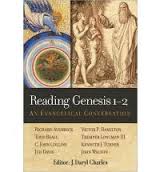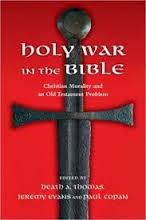Bowing to the unreasonable pressures of publishers who actually expect me to produce something in exchange for money, I am WAAAAAAAAAY behind in my reading and in my blogging about what I am reading.
Meeting this problem half way, I simply want to mention today two books I received over the past few weeks, both of which I have read/skimmed and that I plan on commenting on in the days/weeks to come after I’ve had a chance to read them more carefully.
 Both are edited volumes, and the first throws it’s hat in the ring on Genesis and evolution: Reading Genesis 1-2: An Evangelical Conversation
Both are edited volumes, and the first throws it’s hat in the ring on Genesis and evolution: Reading Genesis 1-2: An Evangelical Conversation.
Edited by J. Daryl Charles, director and senior fellow of the Bryan Institute for Critical Thought and Practice in Chattanooga, TN, this volume arises out of a symposium at the Bryan Institute in 2011. The core contributors to the volume are Richard Averbeck (Trinity Evangelical Divinity School), Todd Beall (Capital Bible Seminary), C. John Collins (Covenant Theological Seminary), Tremper Longman III (Westmont College), and John Walton (Wheaton College). Each contributes an essay with responses to the others.
Of the two books, I spent more time with this one. After my first pass, although there are definite high points, I am not sure how much this volume will eventually contribute to the overall discussion currently brewing in conservative Protestantism, given the strong undercurrent of a defense of inerrancy and biblical literalism reflected in some of the essays.
The second volume concerns the question of God’s violence and “Holy War” in the Old Testament, Holy War  in the Bible: Christian Morality and an Old Testament Problem
in the Bible: Christian Morality and an Old Testament Problem.
Edited by Heath A. Thomas, Jeremy Evans, and Paul Copan, the impetus for the volume grew out of a 2009 colloquium composed of professors from Southeastern Baptist Theological Seminary (Wake Forest, N.C.) and Duke Divinity School, and eventually expanded to include others. Some of the key contributors are Paul Copan, Douglas Earl, David Lamb, and Stephen Chapman, and the disciplines represented are Old Testament studies, philosophy, ethics, and theology.
Both of volumes treat topics of keen interest for me, and both (after a casual read, mind you) strike me as potentially valuable. They lay out a spectrum of views on challenging topics and, as with any volume of this type, readers will find areas of agreement and disagreement.
As soon as my publisher lets out a few links in the chain tying me to my desk, I’ll get into more detail about these books.
